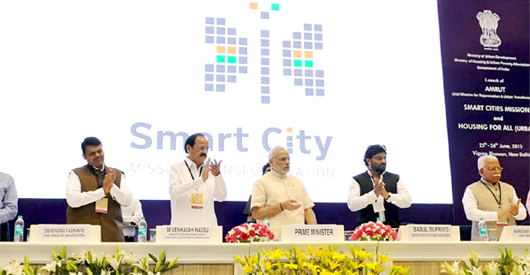New Delhi, Jun 26: Marking a major initiative for urban development in the country, Prime Minister Narendra Modi on Thursday launched the Smart Cities Mission, Atal Mission for Rejuvenation and Urban Transformation (AMRUT) and Housing for All.

The main objective of the three ambitious schemes launched by the Prime Minister is to develop Indian cities and towns as new engines of growth.
The three big ticket projects – Smart Cities Mission, Atal Mission for Rejuvenation and Urban Transformation (AMRUT) and the Housing for All, now named as Pradhan Mantri Awas Yojana (PMAY), are worth Rs four lakh crore.
While AMRUT seeks to ensure basic infrastructure and sanitation, PMAY enables the urban poor to own decent and affordable houses.
Launching these three schemes, the Prime Minister said under Smart Cities Mission, quality of life will be enhanced in 100 identified cities and towns by ensuring quality infrastructure, improving services through application of smart solutions and enabling a clean and sustainable environment.
These 500 cities will become engines of growth and they in turn should develop into smart cities, Modi said.
Citing the existing housing shortage of 2 crore units, the Prime Minister said that India was completing 75 years of independence in 2022, and by then, it was our responsibility to provide a house for everyone.
Modi said today there is a lack of holistic vision about urban planning, and expansion is driven not by the administrators of a city, but by property developers. Through AMRUT, the aim of the Government is to give cities themselves the chance to plan their future growth.
PM also unveiled the criteria and guidelines for the smart cities and other schemes besides releasing operational guidelines for the three urban missions, unveiling logos and tag lines.
500 cities having 1 lakh and more population will be chosen for AMRUT project, PM Modi said, adding that neither the Centre not states will have any discretion in choosing 100 cities through a competition for smart cities scheme.
The Minister for Urban Development Venkaiah Naidu, and the Minister of State for Urban Development Babul Supriyo, the Chief Minister of Maharashtra Devendra Fadnavis, the Chief Minister of Haryana Manohar Lal Khattar, and the Deputy Chief Minister of Jammu and Kashmir, Nirmal Kumar Singh were present on the occasion.
The launching event will be followed by a two-day workshop in which over 1000 mayors, municipal heads, ministers concerned from states and their chief secretaries will take part.
UP leads the pack as it has been given the opportunity to nominate 13 cities to be developed as smart cities, while 54 cities in the state have been identified under AMRUT scheme.
Tamil Nadu comes second with the allocation of 12 smart cities and 33 AMRUT cities.
While Maharashtra has been alloted 10 cities to nominate under the smart city project, Gujarat and Karnataka are eligible to develop six cities each.
Under AMRUT scheme, 37, 31 and 21 cities have been identified in Maharashtra, Gujarat and Karnataka respectively.
Delhi has got one city each for Smart City and AMRUT.
According to the criteria finalised by the government, West Bengal and Rajasthan get to nominate four cities for the smart city project; Bihar, Andhra Pradesh and Punjab three cities; Odisha, Haryana, Telangana and Chhatisgarh two cities; and Jammu and Kashmir, Kerala, Jharkhand, Assam, Himachal, Goa, Arunachal and Chandigarh one city each.
Similarly, under the AMRUT scheme, 31 cities have been identified in Andhra Pradesh; 30 in Rajasthan; 28 in West Bengal; 27 in Bihar; 19 in Odisha and Haryana; 18 in Kerala; 17 in Punjab; 15 in Telangana and 10 in Chhattisharh.
Twelve states - UP, Tamil Nadu, Maharashtra, MP, Gujarat, Karnataka, Andhra Pradesh, Rajasthan, Punjab, Haryana, Telangana and Chhattisgarh would lead the urban transformation piloted by the Modi-led government.
These 12 states account for 70 percent of smart cities to be developed and AMRUT cities to be rejuvenated.
Of these 12 states, eight are under the rule of BJP or its allies accounting for about half of smart cities to be developed and 225 of 476 AMRUT cities identified so far. UTs are also the responsibility of central government.





Comments
Add new comment